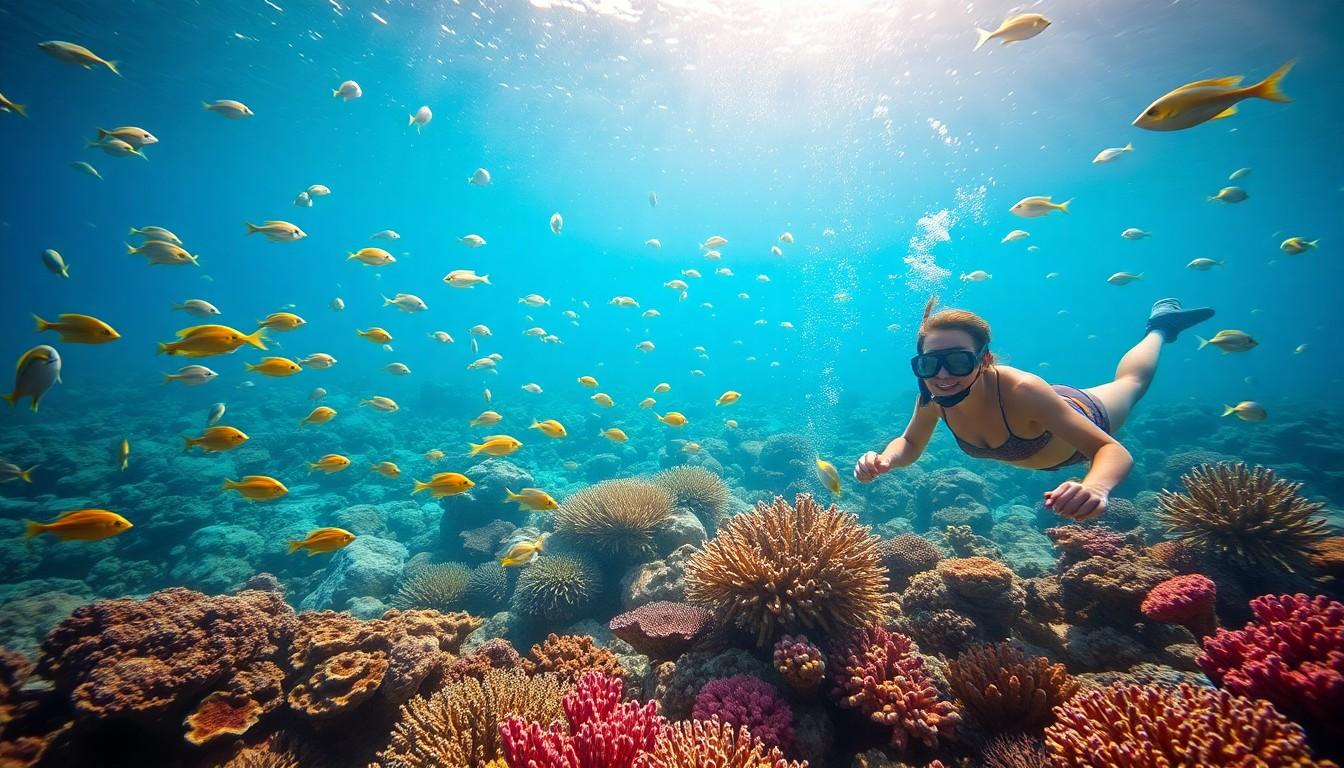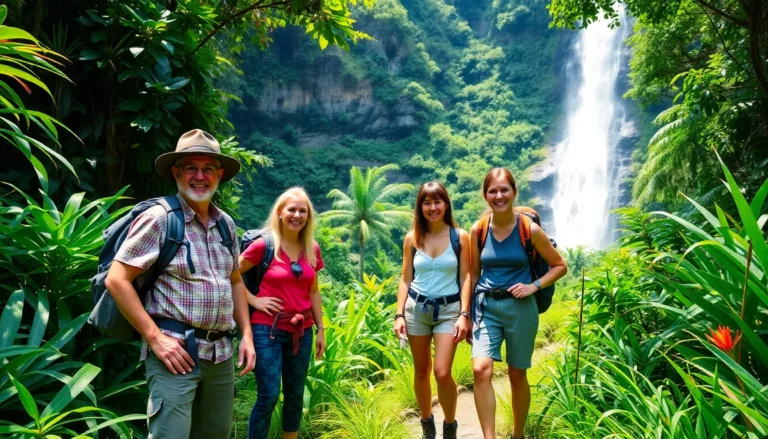Imagine exploring the wonders of Egypt without leaving a giant carbon footprint behind. Eco-tourism in this ancient land offers a unique opportunity to experience its breathtaking landscapes and rich cultural heritage while being kind to Mother Earth. From the lush oases of Siwa to the crystal-clear waters of the Red Sea, Egypt’s natural beauty is just waiting to be discovered—without the guilt of contributing to climate change.
Travelers can swap traditional pyramids for eco-friendly lodges and sustainable tours that support local communities. It’s not just about seeing the sights; it’s about making a positive impact. So why not trade the usual tourist traps for a more responsible adventure? Join the eco-friendly revolution and dive into the wonders of Egypt, where every step can lead to a greener planet and unforgettable memories.
eco-tourism in egypt
Eco-tourism in Egypt offers a unique way to experience its diverse landscapes while preserving the environment. Travelers encounter adventure in areas like the Red Sea, famed for its coral reefs and marine life. Beaches near Sharm El-Sheikh provide opportunities for snorkeling and diving in pristine waters.
Exploring the desert regions presents visitors with majestic sand dunes and ancient oases. Local guides provide insights into Bedouin culture and sustainable practices, enriching the travel experience. Eco-friendly lodges scattered throughout the country feature solar energy and water conservation systems, minimizing ecological footprints.
The impact of eco-tourism extends beyond environmental benefits. Supporting local artisans and communities encourages economic growth and sustainability. By choosing local food and handicrafts, travelers help maintain traditions and secure livelihoods for families.
National parks such as Wadi El Gemal and Ras Mohammed showcase Egypt’s natural beauty and biodiversity. These protected areas highlight conservation efforts and promote responsible tourism practices. Wildlife enthusiasts can observe native species in their natural habitats, raising awareness about the importance of preservation.
Participating in eco-tourism fosters a deeper connection with Egypt’s cultural heritage. Engaging with local communities allows travelers to learn about historical sites while promoting cultural exchange. Sustainable travel methods, such as biking or walking, enhance the adventure and reduce carbon footprints.
The call for responsible tourism resonates throughout Egypt’s tourism sector. Eco-tourism not only enriches individual experiences but also contributes to global efforts against climate change. Embracing eco-friendly initiatives empowers travelers to explore Egypt while making a positive impact on both the environment and local communities.
Popular Eco-Tourism Destinations

Egypt offers several eco-tourism destinations where travelers can experience the beauty of nature while supporting local communities.
The Red Sea Coast
The Red Sea Coast stands out for its vibrant coral reefs and diverse marine life. Tourism activities here include snorkeling and diving, which allow visitors to witness stunning underwater ecosystems. Eco-friendly resorts along the coast emphasize sustainability, using solar energy and minimizing plastic waste. Local organizations often conduct beach clean-ups, further protecting marine habitats. Engaging with experienced guides provides insights into conservation efforts and the importance of preserving these natural resources.
Siwa Oasis
Siwa Oasis presents a unique blend of cultural and natural experiences. Travelers can explore picturesque landscapes of salt lakes and palm groves, which showcase the region’s ecological diversity. Authentic eco-lodges incorporate traditional architecture and renewable energy. Visitors often have opportunities to engage directly with the local Berber community, learning about their customs and sustainable agricultural practices. Tours in Siwa emphasize hiking and biking, allowing deeper connections with the environment while reducing the carbon footprint.
The Nile Valley
The Nile Valley features lush farmland and rich cultural heritage, providing eco-tourists with picturesque landscapes. Exploring ancient temples and local villages enables travelers to appreciate the region’s history while promoting sustainable tourism. Boat rides along the Nile offer serene views and lower emissions compared to motorized transport. Eco-conscious accommodations focus on utilizing local resources, promoting sustainability in both agriculture and tourism. Connecting with local artisans highlights traditional crafts, enhancing cultural appreciation among visitors.
Benefits of Eco-Tourism in Egypt
Eco-tourism in Egypt provides numerous advantages that support environmental preservation and bolster local economies. Travelers discover sustainable ways to enjoy the country’s natural beauty while contributing positively to local communities.
Environmental Conservation
Environmental conservation thrives through eco-tourism initiatives. Notably, eco-friendly lodges harness solar power and implement water-saving practices. These accommodations actively lower their ecological footprints. In addition, national parks like Wadi El Gemal prioritize habitat protection and biodiversity. Tourists engaging with local guides learn about conservation efforts and respect for fragile ecosystems. Wildlife tours offer opportunities to observe native species in their natural habitats. Ultimately, responsible tourism fosters a deep appreciation for Egypt’s unique landscapes.
Economic Opportunities for Locals
Economic opportunities arise as eco-tourism flourishes. Local artisans benefit from increased demand for handcrafted goods and traditional products. Sustainable tours create jobs for communities, enhancing livelihoods in remote areas. Visitors interacting with residents cultivate meaningful relationships that promote cultural exchange. In Siwa Oasis, for instance, eco-lodges incorporate local building materials, employing local craftsmen. This support for local economies strengthens the commitment to preserving cultural heritage. Engaging in eco-tourism allows travelers to make a positive impact while experiencing authentic Egyptian traditions.
Challenges Facing Eco-Tourism in Egypt
Eco-tourism in Egypt encounters several challenges that affect its growth and sustainability. Addressing these obstacles is essential for maximizing eco-tourism’s benefits.
Infrastructure Limitations
Limited infrastructure significantly hampers the development of eco-tourism in remote areas. Many eco-friendly lodges and attractions lack easy access to roads and transportation. In addition, insufficient facilities in some regions fail to meet the needs of travelers seeking sustainable experiences. Internet connectivity often proves unreliable, which can deter potential visitors from planning their trips. Enhancing infrastructure investment can improve accessibility and encourage eco-conscious travelers to explore Egypt’s natural wonders.
Climate Change Impact
Climate change poses substantial risks to Egypt’s ecosystems and eco-tourism industry. Rising temperatures threaten coral reefs along the Red Sea, jeopardizing marine life and affecting snorkeling experiences. Changes in rainfall patterns impact agriculture and desert landscapes, challenging the sustainability of local communities. Natural disasters, intensified by climate change, can damage eco-tourism resources and deter visitors. Proactive measures are crucial for protecting these vibrant ecosystems and ensuring that eco-tourism remains viable in the face of climate change challenges.
rich cultural heritage
Eco-tourism in Egypt offers a unique opportunity for travelers to connect with the country’s breathtaking landscapes and rich cultural heritage. By choosing sustainable practices and supporting local communities, visitors play a crucial role in promoting environmental conservation and economic growth. This responsible approach not only enhances personal experiences but also fosters a deeper appreciation for Egypt’s diverse ecosystems and traditions.
As travelers seek meaningful adventures, eco-tourism stands out as a way to explore while making a positive impact. Embracing this approach ensures that future generations can enjoy the beauty and culture of Egypt, all while contributing to a sustainable future.




